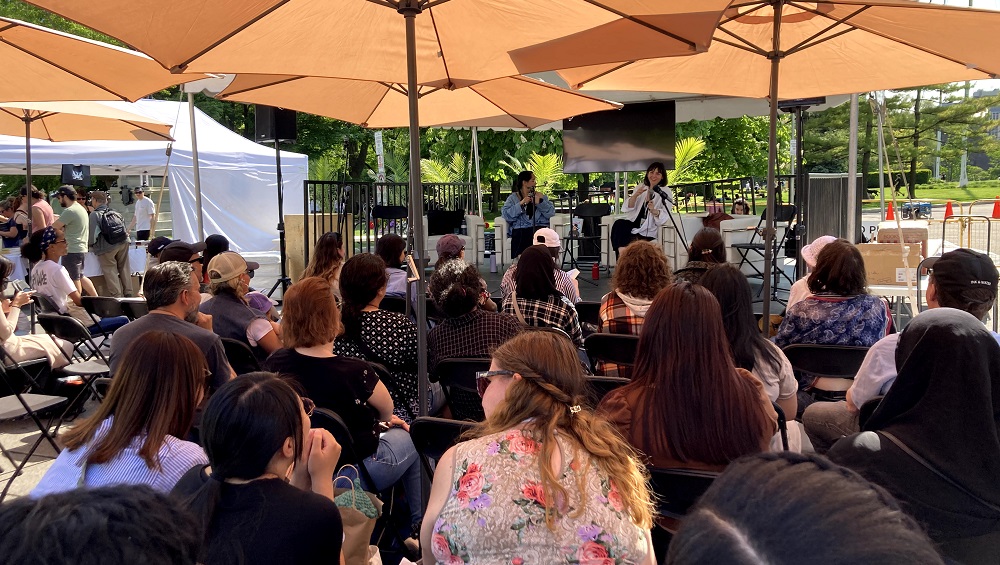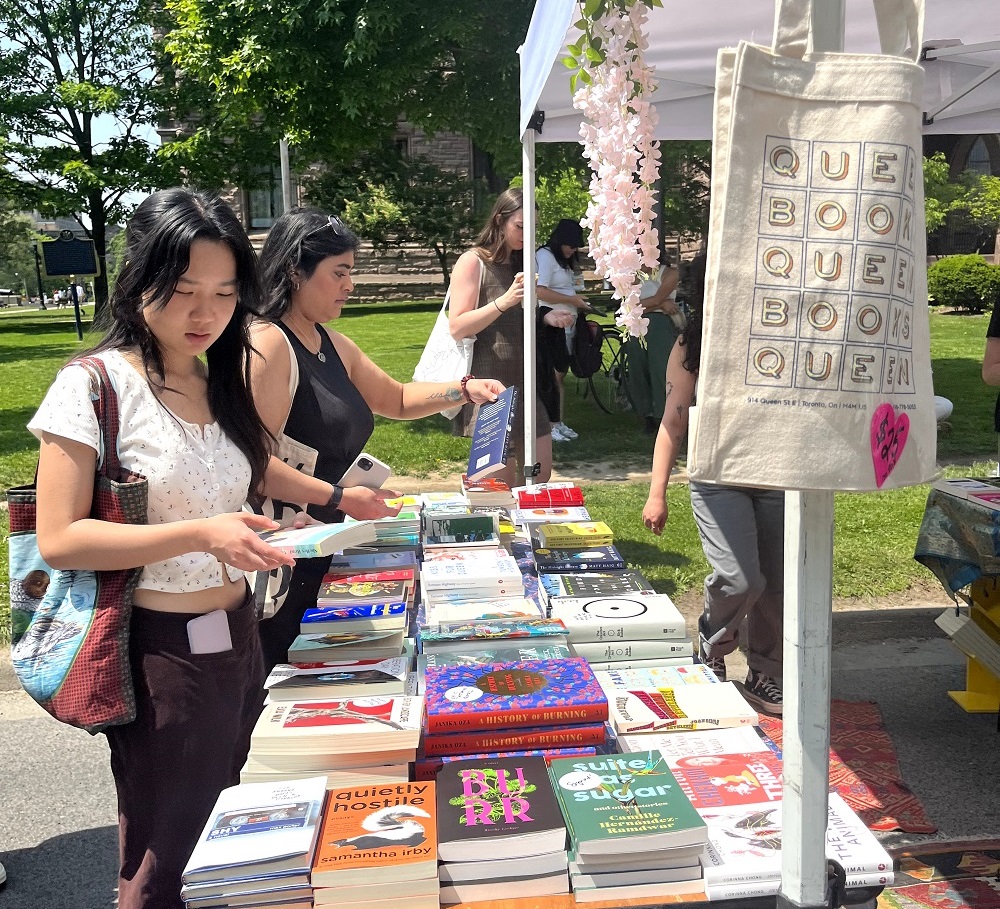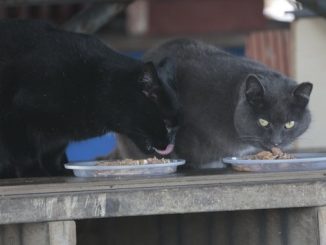As the Director of Programming at The Word On The Street Toronto, Sienna Tristen has been instrumental in steering the festival since 2019, overseeing its growth and evolution as it marks its 35th anniversary this year. Committed to championing literacy and Canadian storytelling, Sienna works tirelessly to ensure that the festival not only celebrates the written word but also provides a platform for Indigenous and Canadian creators

Describe your charity/non-profit/volunteer work in a few sentences.
At The Word On The Street Toronto, we work to champion reading and writing in Canada through a free annual festival and year-round literary programming that spotlights storytellers, fosters community, and promotes literacy, with a specific focus on showcasing Indigenous and Canadian creators. We create an experience where artists can share their labours of love with the world, and where readers and writers of all walks of life can connect. Through the many author talks, readings, workshops, and activities that we program, plus our vibrant open-air book marketplace, we hope to fuel a lifelong love of reading in Canadians for many generations to come!
What problem does it aim to solve?
Literacy is a powerful skill in our modern world—from news articles to novels to bank statements, it’s crucial that Canadians feel fluent and comfortable in the written word. There are many pathways to that fluency, but one of them is through fostering a genuine love of reading. That’s what we aim to do at WOTS. We want to provide high-quality literary events at no cost to attendees, to keep literature accessible to the public. It’s our hope that by engaging with stories they love, Canadians can find empowerment through literacy, whether they’re young or old.
Another problem we aim to solve is the relative lack of exposure for Indigenous and Canadian writers. Despite the hundreds of thousands of incredible artists who call Canada home, the average Canadian’s bookshelf is populated largely with American and international authors. This was especially true back when WOTS was founded 35 years ago. We’ve seen great progress in three and a half decades, but The Word On The Street is still one of the only arts festivals that invites 100% Indigenous and Canadian presenters onto its stages. We’re passionate about this responsibility—we want our local creators to feel uplifted by their communities and for the stories they are telling to be heard.
When did you start/join it?
The Word On The Street Toronto was founded in 1989, for the International Year of Literacy. I became part of the team in 2019, just in time for the organization’s 30-year anniversary. It’s very cool to now be coming up on another big milestone: this September is WOTS’ 35th!
What made you want to get involved?
I was one of those kids who had books instead of friends growing up. Books taught me courage, empathy, curiosity, determination, and so much more. As an adult, giving my energy back to the artform that raised me just makes sense.
I used to think I wanted to work in publishing, as an editor or agent or something similar, but my gosh am I happy I ended up here. There’s something really special about being “book-adjacent”, as I like to say: it’s actually quite emotional. Authors work hard, often all alone, to make a beautiful piece of art. As the Director of Programming, I love being able to hold up a mirror to them and say, Look at you! Look at what you made! We’re so proud of you! Come be celebrated!
What was the situation like when you started?
As I mentioned, I first started at WOTS during the organization’s 30th anniversary. That was a big year. We had a massive audience turnout, lots of very well-established authors speaking onstage, even a bilingual spelling bee! There was every reason to think the festival would keep rolling on, bigger and better every year.
Then the next year was 2020, the first year of the global pandemic. We know how that turned out for public events. For two years, WOTS went fully virtual: we learned how to become digital producers in addition to the rest of our job descriptions. It was an intense pivot. I’m glad we did it because we were still able to provide a place for readers to connect to authors, and for authors to showcase their work. But there are certain things you just cannot achieve as a street festival without a street—for instance, we couldn’t put together our marketplace, which usually houses over a hundred booksellers, publishers, literacy organizations, and more. For all we learned about resourcefulness and accessibility, we also lost a lot of connections in those years.
How has it changed since?
Two years of peak pandemic conditions forced us to re-evaluate our entire strategy—so a lot has changed! We’ve expanded from a one-day event to a two-day, all-weekend festival. We’ve moved our festival site away from Harbourfront Centre and back to Queen’s Park Circle (where WOTS used to be before I started working here). We even tried shifting seasons for a minute: the 2022 and 2023 editions of WOTS happened around May/June, but ultimately we’ve decided that September loves us best.
Aside from these crunchy logistical pieces, there’s also been a shift in tone at the festival. The programming used to lean very heavily on what we call “literary fiction”, with limited room for commercial genres like mystery, romance, or science fiction. Every year of my tenure with WOTS, we’ve moved to equalize that program a little more. Now we’re proud to showcase entire panels of romance, horror, and other much-beloved genres right alongside literary novels, poetry, and non-fiction. This is in direct response to our audiences clamouring for this kind of programming. Since we’re here to foster a love of reading, it only makes sense to create space for the kind of stories people are eager to read!

What more needs to be done?
As with so many nonprofits, the work never ends. Child literacy rates have been significantly impacted as a result of the inconsistent education they received during the COVID-19 years; we’re seeing some really concerning trends with kids struggling to read at their grade levels. We aim to play a part in boosting those literacy skills, by introducing children to exciting books that can help them build confidence in their reading.
Meanwhile, backstage, the organization itself is still recovering from the financial impacts of COVID. Hard costs like erecting stages and tents are only increasing, and the relief funds that were meant to keep organizations afloat during the worst of the pandemic have all but ended now. We’re experiencing the long-term repercussions of a couple of years being thrown off-balance. It’s requiring some pretty awesome transformation on our end to recuperate with grace.
Lastly, on a personal note, I want to see The Word On The Street give some love to non-English storytelling. Remember that bilingual spelling bee I mentioned? As a French speaker, I’m passionate about creating space for Francophone literature to thrive here. And as a language learner, I want to expand beyond the “official” languages of Canada and into a deeper sense of multilingualism at the festival. It’s a hefty undertaking—but I dream of what we could accomplish together. Allons-y!
How can our readers help?
One of the most impactful ways you can help The Word On The Street is by donating. It costs money to put on a free event, especially one on this scale. We recently launched Loonie for WOTS, a call to book lovers everywhere to help raise $107,676 before our festival weekend. 107,676 is (more or less) the number of WOTS attendees we’re expecting to hit the streets this year—the idea is, that if everyone who loves & cares for this festival donated literally one dollar, we would be able to place the financial impact of COVID firmly behind us, and be able to open a new chapter, so to speak. We encourage people to donate now through our website and CanadaHelps page, but please know that we will also be accepting donations on-site at the festival!
Another way you can help is by—well, getting the word on the street about The Word On The Street. We’ve planned a literary celebration of over 100 authors, and we want people to come attend the party. Tell your bookish friends, family, neighbours, coworkers, people you meet at the dog park. Tell everyone! And then come down to Queen’s Park yourself, and enjoy what we’ve made for you.
Do you have any events coming up?
Our free annual festival is right around the corner! On September 28th and 29th, The Word On The Street Toronto will be filling the street around Queen’s Park with books, discussion, laughter, and community. We have over 100 authors confirmed, including Canisia Lubrin, Drew Hayden Taylor, Catherine Hernandez, Kenneth Oppel, and more! You can find our full schedule on our website, and receive updates through our newsletter and social media @torontowots.
Where can we follow you?
Instagram | TikTok | Website | Newsletter
PAY IT FORWARD: What is an awesome local charity that you love?
Book Clubs For Inmates is a charity whose mission is to organize volunteer-led book clubs within federal penitentiaries across Canada—currently, they have over 40 book clubs up and running, from Nova Scotia to British Columbia. I think the work they do is deeply meaningful and reflects the kind of compassion and curiosity I want to see in Canadian society. BCFI will have an info booth at WOTS this September, so please stop by and learn more!




